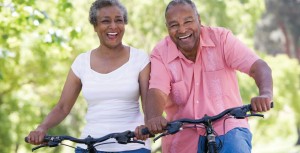
There are many reasons why we tend to slow down and become more sedentary with age. It may be due to health problems, weight or pain issues, or worries about falling. Or perhaps you think that exercising simply isn’t for you. But as you grow older, an active lifestyle becomes more important than ever to your health.
A recent Swedish study found that physical activity was the number one contributor to longevity, adding extra years to your life—even if you don’t start exercising until your senior years. But getting active is not just about adding years to your life, it’s about adding life to your years.
Getting moving can help boost your energy, maintain your independence, protect your heart, and manage symptoms of illness or pain as well as your weight. Regular exercise is also good for your mind, mood, and memory. It’s never too late to find simple, enjoyable ways to become more active, improve your mood and outlook, and reap all of the physical and mental health benefits of exercise.
Physical health benefits of exercise for seniors
As an older adult, exercise can help you to:
– Maintain or lose weight. Regular exercise helps increase your metabolism and build muscle mass, helping your body to burn more calories.
– Reduce the impact of illness and chronic disease. It tends to improve immune and digestive functioning, better blood pressure and bone density, and a lower risk of Alzheimer’s disease, diabetes, obesity, heart disease, osteoporosis, and certain cancers.
– Enhance your mobility, flexibility, and balance. Exercise improves your strength, flexibility, and posture, which in turn can help with your balance and coordination, and reduce your risk of falls. Strength training can also help alleviate the symptoms of chronic conditions such as arthritis.
Mental health benefits
Exercise can also help you to:
– Improve how well you sleep. Quality sleep is vital for your overall health as you get older. Regular activity can help you fall asleep faster, sleep more deeply, and wake feeling more energetic and refreshed.
– Boost your mood and self-confidence. Exercise is a huge stress reliever, help reduce feelings of sadness, depression, and anxiety. Being active and feeling strong can also help you feel more self-confident.
– Improve your brain function Activities like Sudoku or crossword puzzles can help keep your brain active, but little comes close to the beneficial effects of exercise on the brain. It can aid brain functions as diverse as multitasking and creativity, and help to prevent memory loss, cognitive decline, and dementia. Getting active may even help slow the progression of brain disorders such as Alzheimer’s disease.
If you dread working out, you’re not alone. But you don’t have to exercise until you’re soaked in sweat or every muscle aches to make a big difference to your health. Think about activities that you enjoy and how you can incorporate them into an exercise routine:
– Listen to music or an audiobook while lifting weights
– Window shop while walking laps at the mall
– Get competitive while playing tennis
– Take photographs on a nature hike
– Meet new people at a yoga class or fitness center
-Watch a favorite movie or TV show while walking on the treadmill
-Instead of chatting with a friend over coffee, chat while walking, stretching, or strength training
– Walk the golf course instead of using a cart
– Walk or play fetch with a dog
– Go for a run, walk, or cycle when you’re feeling stressed—see how much better you feel afterwards.
– Find an exercise buddy, someone whose company you really enjoy, and try activities you’ve never tried before—you may find something you love. At worst, you’ve spent time with a good friend.
Build a balanced exercise plan that include the following: do balance exercises like yoga, tai chi, and posture exercises to gain confidence with balance; cardiovascular exercise like walking, stair climbing, swimming, hiking, cycling, rowing, tennis, and dancing; strength and power training use weight or external resistance from machines, free weights, elastic bands, or your own body weight; participate in senior sports or fitness classes; do water aerobics and water sports.
Listen to your body. Exercise should never hurt or make you feel lousy. Stop exercising immediately and call your doctor if you feel dizzy or short of breath, develop chest pain or pressure, break out in a cold sweat, or experience pain. And put your routine on hold if a joint is red, swollen, or tender to the touch—the best way to cope with injuries is to avoid them in the first place. If you regularly experience pain or discomfort after exercising, try exercising for less time but more frequently throughout the day.


